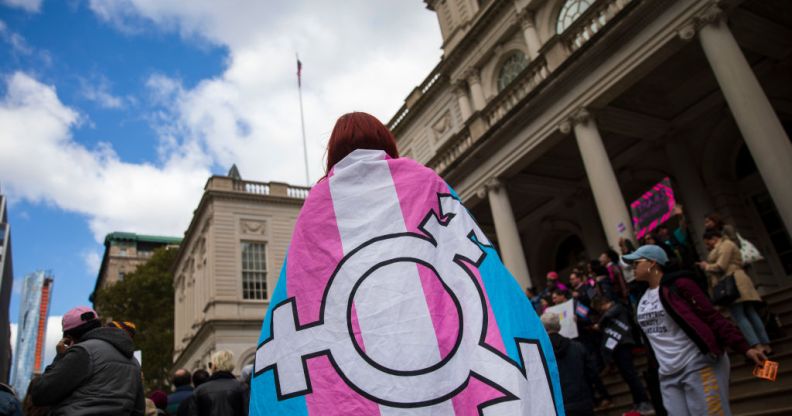This US state has refused to pay for trans healthcare for almost 40 years. Two teenagers are trying to end the ban once and for all

Drew Angerer/Getty
Two transgender teenagers are suing Arizona over its blanket ban on paying for transition-related healthcare for Medicaid recipients.
The claimants, 17-year-old D.H. and 15-year-old John Doe, are bringing a class-action lawsuit alleging that their civil rights are being violated by Arizona’s prohibition on transition-related surgeries.
Arizona is one of 10 states that explicitly bans coverage for transition-related treatments to transgender Medicaid recipients, according to Metro Weekly.
The National Center for Lesbian Rights filed the complaint against the Arizona Health Care Cost Containment System on August 6.
“D.H. and John bring this lawsuit on behalf of themselves and similarly situated individuals to challenge Arizona’s categorical prohibition of coverage of medically necessary treatments for gender dysphoria, specifically, male chest reconstruction surgery,” the complaint reads.
The pair argue that top surgery is a medically necessary treatment for their gender dysphoria and that by denying them this healthcare, Arizona is causing them physical and psychological harm.
The National Center for Lesbian Rights argues that given the Supreme Court’s recent historic decision making it illegal to fire workers for being gay or trans, Medicaid’s ban on transgender healthcare constitutes sex discrimination.
The lawsuit comes a year after a Wisconsin judge ruled that Medicaid must cover transgender healthcare, including hormone therapy and gender confirmation surgeries such as chest surgery.
The US district judge made the ruling in the case of four trans Wisconsin residents, who were challenging a 1997 provision that excluded coverage of “transsexual surgery” for Medicaid recipients.
The judge ruled that the provision was discriminatory.
Lawsuit against Arizona’s Medicaid ban on transgender healthcare.
Both of the claimants in the case against Arizona currently wear binders.
D.H. started wearing a binder to flatten his chest aged 12. He says this helps with his gender dysphoria but significantly impairs his ability to function, with the pain and discomfort caused by wearing the binder interfering with his ability to focus on school and homework.
Both D.H.’s paediatrician and his therapist have recommended he get top surgery, but this was denied by Medicaid because in Arizona, there’s been a categorical ban on transition-related coverage since 1982.
John also wears a binder to alleviate his gender dysphoria, which according to the lawsuit is “tight and restrictive”.
“Even with the binder, John feels uncomfortable being outside without layers of clothing. He wears a hooded sweatshirt nearly every day, including in the summer.
“John’s chest also hinders his social interactions. For example, John wears his binder and a t-shirt when at the pool, often having to answer uncomfortable questions about why he insists on wearing a t-shirt in the water.”
John’s healthcare team have also recommended he get top surgery, which again he can’t because of Arizona’s ban on transition healthcare.
The lawsuit says: “Arizona disregards the transition-related health care needs of Medicaid’s transgender beneficiaries. In doing so, Arizona exposes transgender people to significant and avoidable harms to their health and well-being, in violation of the US Constitution and federal law.”
It alleges that Arizona’s ban violates two provisions of the Medicaid Act: that states must provide “early and periodic screening, diagnostic and treatment’ for individuals under 21 before medical conditions become more complex and treatments become more costly; and the act’s comparability requirements, which say that any medically necessary treatment that would be given to one individual cannot be arbitrarily denied to another.
The National Center for Lesbian Rights is asking for the state to pay for the pair’s top surgeries now, before the court case begins.

